

Education of Disadvantaged Children in OIC:
The Key to Escape from Poverty
108
Issues with teachers are not limited to lack of skills and capacity. Teachers’ employability and
available form of employment (full time teachers, contractual teachers etc.) create significant
problems in the sector. Analysis carried out using the 2013 Labour Force Survey (LFS) finds that
1 in every 4 education faculty graduates aged 25-29 are not employed.
289
Of those who are, nearly
20 percent are not practicing teachers.
290
In other words, these analyses show that only 6 in every
10 education faculty graduates are working as teachers as they are trained to be.
Test based education system:
The Turkish education system heavily relies on national
standardised tests which all students are subject to in order to continue higher levels of education.
These standardised tests make students and the whole education system focus more on the test
subjects and techniques and pay less attention to other matters related to the students’ creative
and intellectual development. This issue was also acknowledged by the MoNE in the 2015 – 2019
Strategic Plan where subjects like arts, sports and culture are being acknowledged as areas that
require attention.
291
Moreover, there seem to be significant gaps between the number of students
entering a school and the number of graduates. To prepare for national exams in the last year of
high school many students are either transferred to “open high schools” or private basic high
schools which used to be private teaching institutions and provide teaching services tailored to
the national exams (called “
dershane
”).
292
Another negative consequence of this system is that
students are trained in subjects which do not necessarily match their skills. This is likely to
become apparent later in terms of labour market mismatches.
Inclusive education:
Inclusive education means providing equal opportunities to anyone
irrespective of their disability status, ethnic identity or any other categories that may face
discrimination.
293
Turkey’s main position regarding inclusive education concentrates on
education of childrenwith special needs. Legislation is well established and detailed, starting from
the first diagnosis and then continuing with monitoring and guidance. However, although the
legislation is well defined, the coverage is still low, and a lack of data also prevents more concrete
conclusions.
To promote inclusive education MoNE also has a programme titled operational “Programme on
Supporting Inclusiveness where Roma Citizens Live in High Density”. This programme aims to
offer better inclusive education opportunities for children and families.
Syrian refugee crisis:
Following the outbreak of the Syrian civil war, the resettlement of Syrian
refugees and providing services for them became an issue for host countries and communities.
Turkey has more than 3 million Syrians as of June 2017, and about 33 percent of them are school
age children.
294
Currently Syrian children are either in temporary education centres (TECs),
289
ERG (2015)
290
ERG (2015)
291
This is both mentioned in the MoNE 2015 – 2019 Strategic Plan, and also in our meeting at MoFSP.
292
Se
e http://www.haberturk.com/gundem/haber/1183997-sinav-kaygisi-gozde-liseleri-bosaltti293
ERG (2016)
294
Number of Syrians under temporary protection in Turkey is 3,049,879 as of 15 June 2017. Number of children from age 5 to
18 is 1,020,598. Se
e http://www.goc.gov.tr/icerik6/temporary-protection_915_1024_4748_icerik















